Do names really mean anything, even when they seem to? Individuals in present day America called Smith, Jackson, Washington, or Redhead are not usually smiths, sons of Jack, residents in Washington, or red-haired. The disconnect between sense and usage in these particular names is mainly the result of hereditary surnaming back in England and Scotland, but this is not its only source. Names change their shapes, get borrowed into different cultures, and are sometimes re-interpreted to mean something other than what they originally meant. The frozen food company, Birds Eye, took its brand name from the founder’s surname, Clarence Frank Birdseye II of Montclair, New Jersey. His family had migrated from England to Connecticut in the seventeenth century, and the name’s meaning as a nickname looks obvious. But when it is traced back in English historical records, Birdseye turns out to be a habitational name, an altered form of the Lancashire gentry surname Bardsley, which migrated to Buckinghamshire, England, in the fifteenth century and was simplified there from the sixteenth century onward to Bardsey, Berdsey, Burdsey, and Birdseye.
The underlying cause for the disconnect is that names, unlike words, don’t have to stay meaningful in order to do their job of identifying individuals or groups of people. In fact, most American family names make no sense at all today and it is fascinating to uncover their original meanings and what they tell us about the history of the people who bear them. Hereditary surnames are especially vulnerable to changes in pronunciation that obscure their original senses. Starbuck, for example, seems to be an altered form of Tarbuck, which is recorded in the thirteenth century as the surname of the family who were lords of Tarbock in Lancashire, England. In the 1630s, Edward Starbuck, a coloniser from Derbyshire, England, set up a whaling company on Nantucket Island. Herman Melville borrowed the surname for the chief mate of the whaling ship Pequod in his novel Moby Dick to give his incredible story an appearance of local veracity. It is this fictional character that the coffee chain is arbitrarily named for.
